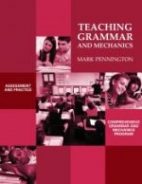Punctuation of Book Chapter Titles
Punctuation of Book Chapter Titles
Play the quick video lesson HERE and click the upper left back arrow to return to this lesson.
Common Core Language Standard 2
Authors use book chapter titles for a variety of purposes. In a textbook the chapter title usually deals with the main topic of that chapter. In a story the book chapter title may be descriptive about what will take place in that chapter, such as with J. K. Rowling’s “The Goblin’s Revenge” from Harry Potter and the Deathly Hallows or something that makes you want to keep reading, such as with “A Surprising Ghost” in Lynne Reid Banks’ The Key to the Indian.
Today’s mechanics lesson is on how to punctuate book chapter titles. Remember that we underline or italicize the titles of books.
Now let’s read the mechanics lesson and study the examples.
Place quotation marks before and after the titles of book chapters. Book chapter titles are parts of whole things, small things, or things that can’t be picked up from a table. Example: “Last Time”
Now circle or highlight what is right and revise what is wrong according to mechanics lesson.
Practice: I just read the last chapter in the book titled “A Fitting End.” The first chapter was titled A Fitting Beginning.
Let’s check the Practice Answers.
Mechanics Practice Answers: I just read the last chapter in the book titled “A Fitting End.” The first chapter was titled “A Fitting Beginning.”
Now let’s apply what we’ve learned.
Writing Application: Write your own sentence using a book title and a book chapter title.
This writing opener is part of a comprehensive language conventions lesson from the Grammar, Mechanics, Spelling, and Vocabulary Grades 4‒8 programs.
*****
I’m Mark Pennington, author of the full-year interactive grammar notebooks, grammar literacy centers, and the traditional grade-level 4, 5, 6, 7, 8 and high school Teaching Grammar and Mechanics programs. Teaching Grammar and Mechanics includes 56 (64 for high school) interactive language conventions lessons, designed for twice-per-week direct instruction in the grade-level grammar, usage, and mechanics standards. The scripted lessons (perfect for the grammatically-challenged teacher) are formatted for classroom display. Standards review, definitions and examples, practice and error analysis, simple sentence diagrams, mentor texts with writing applications, and formative assessments are woven into every 25-minute lesson. The program also includes the Diagnostic Grammar, Usage, and Mechanics Assessments with corresponding worksheets to help students catch up, while they keep up with grade-level, standards-aligned instruction.
Or why not get the value-priced Grammar, Mechanics, Spelling, and Vocabulary (Teaching the Language Strand) grades 4, 5, 6, 7, and 8 BUNDLES? These grade-level programs include both teacher’s guide and student workbooks and are designed to help you teach all the Common Core Anchor Standards for Language. In addition to the Teaching Grammar and Mechanics program, each BUNDLE provides weekly spelling pattern tests and accompanying spelling sort worksheets (L.2), 56 language application opener worksheets (L.3), and 56 vocabulary worksheets with multiple-meaning words, Greek and Latin word parts, figures of speech, word relationships with context clue practice, connotations, and four square academic language practice (L.4, 5, and 6). Comprehensive biweekly unit tests measure recognition, understanding, and application of the grammar, mechanics, and vocabulary components.
The program also has the resources to meet the needs of diverse learners. Diagnostic grammar, usage, mechanics, and spelling assessments provide the data to enable teachers to individualize instruction with targeted worksheets. Each remedial worksheet (over 200 per program) includes independent practice and a brief formative assessment.
Check out the brief introductory video and enter DISCOUNT CODE 3716 at check-out for 10% off this value-priced program. We do sell print versions of the teacher’s guide and student workbooks. Contact mark@penningtonpublishing.com for pricing. Read what teachers are saying about this comprehensive program:
The most comprehensive and easy to teach grammar, mechanics, spelling, and vocabulary program. I’m teaching all of the grade-level standards and remediating previous grade-level standards. The no-prep and minimal correction design of this program really respects a teacher’s time. At last, I’m teaching an integrated program–not a hodge-podge collection of DOL grammar, spelling and vocabulary lists, and assorted worksheets. I see measurable progress with both my grade-level and intervention students. BTW… I love the scripted lessons!
─Julie Villenueve


